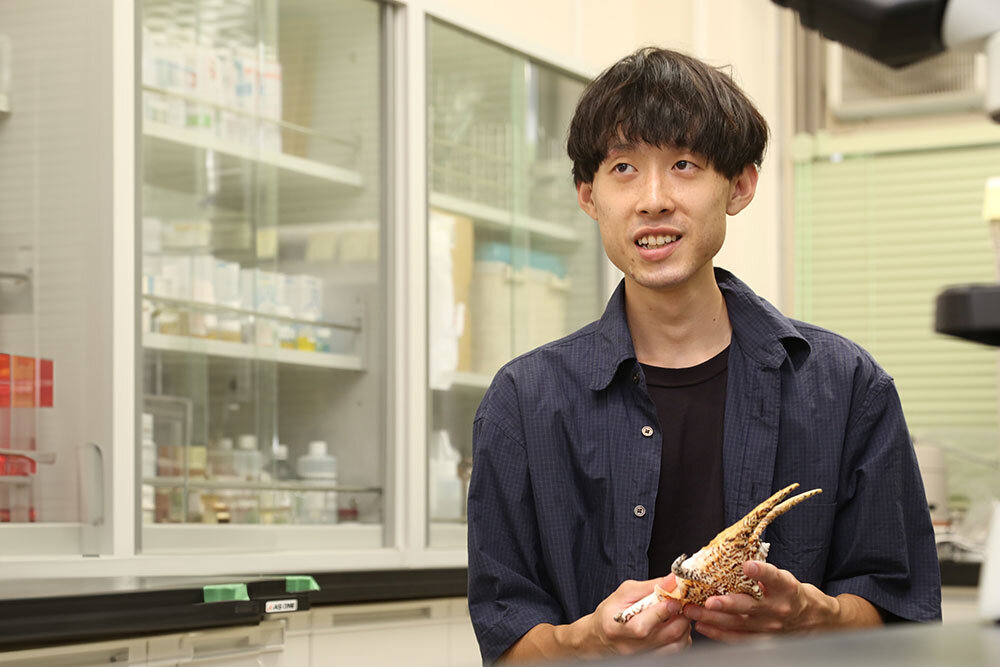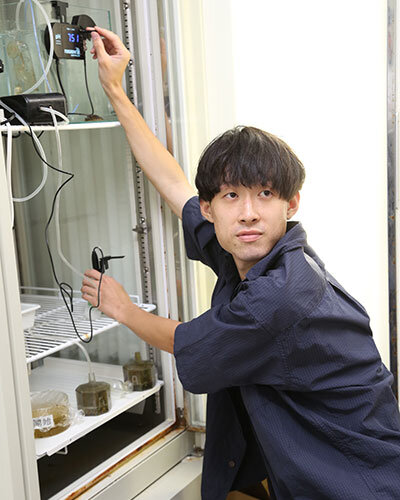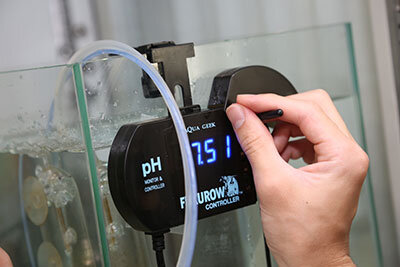INTRODUCTION学生紹介
- HOME
- support
- Student Introduction
- MATSUMOTO RYO
STUDENT INTRODUCTION
Applied Marine Environmental Studies
MATSUMOTO RYO
Specializations:Marine Ecosystem Studies
Main academic advisor:KON, Koetsu
Mentor:SHIBATA, Mario / SUZUKI, Naoki

First transfer student from the “Marine AI Core Course” in the WISE Program: Career differentiation and advantageous job prospects after completing the doctoral program
Simultaneously conducting three research projects on ocean acidification and chitons
After studying molecular and cellular biology at other university, I entered graduate school at TUMSAT to engage in research on marine ecology. Since starting graduate school, I have been researching the impact of ocean acidification (OA) on marine ecosystems.
I have three research themes, all related to chitons. Chitons are mollusks that play a role in the ecosystem by feeding on algae and removing sessile animals like barnacles. However, there are concerns that their shells may dissolve due to ocean acidification. Therefore, one of my research projects involves investigating effects of OA on relationship between changes in chitons in marine areas where volcanic activity has acidified the seawater. This research found that chitons are affected negatively, so another research project examines how this could cascade to other organisms. Lastly, I am also researching the impact on their behavior. I am conducting these three studies in parallel.
Learning AI and differentiating my career to expand post-doctoral options
 I transferred into the WISE Program from a doctoral program because I felt anxious about my career path when advancing to the doctoral program--job hunting changes when you go beyond a master's degree. I was also worried that I couldn't afford to fail in finding a job at my age. However, by participating in the WISE Program, I can add artificial intelligence and analytical skills to my research abilities. This will lead to career differentiation and should expand my future options.
I transferred into the WISE Program from a doctoral program because I felt anxious about my career path when advancing to the doctoral program--job hunting changes when you go beyond a master's degree. I was also worried that I couldn't afford to fail in finding a job at my age. However, by participating in the WISE Program, I can add artificial intelligence and analytical skills to my research abilities. This will lead to career differentiation and should expand my future options.
Rather than immediately incorporating what I learn in the WISE Program into my current research, I am studying so that I can quickly utilize and apply machine learning when it becomes necessary for future research. I am studying for the future in a way that will benefit both my career and research.
The first transfer student from the "Marine AI Core Course" to the WISE Program
I was told that I was the first to transfer into the WISE Program from the Marine AI Core Course.
To be eligible for transfer, you need to earn the required credits in the WISE Program courses, but since the transfer system from the Marine AI Core Course had just been established, only those who had taken the courses in advance could transfer. I took the courses thinking, "If I take these classes, there might be a chance to transfer," and my hunch was correct :-).
The transfer exam was a presentation, and its content was the same as that of the doctoral program entrance exam.
 I took WISE Program courses during my master's program and self-studied AI to implement cluster analysis in my research. However, I still feel a difference in knowledge and experience compared to those participating in the program since their master's. It is also challenging to learn methods I have never used before. To bridge that gap, I diligently attend each class and study between my research activities. Specifically, as a participant in the WISE Program, I have free access to paid content for learning about machine learning and AI, which I use to study.
I took WISE Program courses during my master's program and self-studied AI to implement cluster analysis in my research. However, I still feel a difference in knowledge and experience compared to those participating in the program since their master's. It is also challenging to learn methods I have never used before. To bridge that gap, I diligently attend each class and study between my research activities. Specifically, as a participant in the WISE Program, I have free access to paid content for learning about machine learning and AI, which I use to study.
Studying AI while working on three research projects is tough, and there is not enough time, but I am determined to put in the effort for my future.
Looking forward to residency, hoping to return to academia after gaining real-world experience
We are assigned career mentors in the WISE Program, but since I just transferred two months ago, my mentor has yet to be determined. However, I wanted to start moving quickly toward the residency program, so I consulted with Project Associate Professor Kino in the Marine AI Development and Evaluation Center (who coordinates collaboration with the Marine AI Consortium) and received advice on recommended places for residency.
During the matching week, when students can meet with people from various companies, I heard about what companies are doing and gained a deep understanding of the kind of human resources they are looking for. The residency program offers similar benefits; it is an excellent opportunity to expand career horizons while deepening knowledge of machine learning.
Residency, in particular, is one of the major attractions of the WISE Program. It will allow me to understand how I can utilize my expertise in private companies and what skills are required in the fields of climate change and ocean acidification. It is helpful to have access to information that I want to know but is not readily visible.
I am still deciding whether to stay in academia or find a job in the future, but I would like to gain work experience out in the real world first. Entering a postdoctoral position immediately can limit future job opportunities. However, it is possible to return to academia after working in a research and development position at a private company. After completing my PhD, my ideal plan is to find a job somewhere, work for about ten years, and then return to academia to continue my research as a faculty member.

